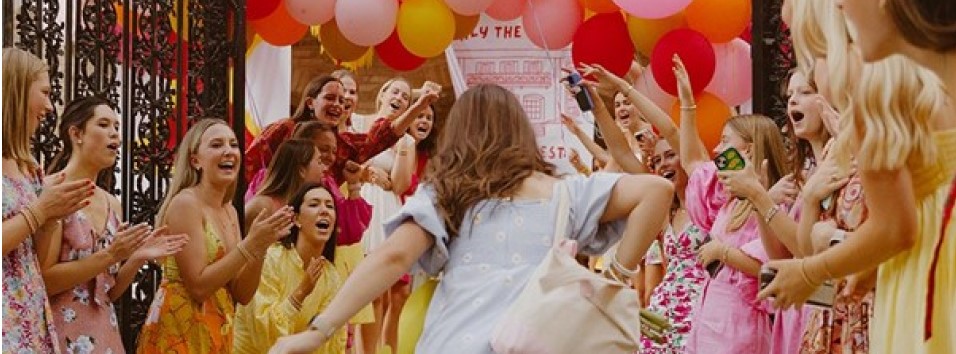The secrets to sorority admission? Perfect highlights and an image consultant


This article was originally published on 19 September, 2023 by author Charlie McCann in 1843 magazine.
As the clock struck five, shrieks could be heard in the distance. Outside a red-brick mansion at the University of Texas in Austin, a crowd of young women looked expectantly up the road. They had been singing and waving paper fans, hoping to slow their make-up’s inevitable slide down their faces in the oppressive heat. “This is the kind of material that shows sweat,” said one woman, inspecting her pink shirt with disapproval.
The shrieking grew louder. Kristin Wallach, a woman in her 50s standing on the edge of the group, started filming on her phone. “Here they come,” she said. As a pack of girls ran towards the house, the welcome party whooped with anticipation. When they got there, both groups of women fell on each other, screaming with delight. It was like a medieval battle scene – chainmail and crossbows replaced with sundresses, designer trainers and expensive handbags.
It was like a medieval battle scene – chainmail and crossbows replaced with sundresses, designer trainers and expensive handbags
I was in Austin to witness Bid Day – when students find out whether their application to join a sorority has been successful. Fourteen percent of undergraduates at the University of Texas belong to a sorority or fraternity (at other universities the figure is much higher). Across America, these single-sex clubs, steeped in ritual and tradition, give their members opportunities to socialise and network. Sororities and fraternities are national organisations, with branches at various universities, and membership lasts a lifetime. Their secrets are keenly guarded, as is their privilege. In 2013 the University of Alabama ordered its sororities to stop segregation based on race, after an outcry when two of its black students were allegedly excluded from a sorority (in response the sorority said it “prohibits discrimination on the basis of race”).
Amid the national soul-searching that followed the murder of George Floyd in 2020, a wave of students at various universities quit their sororities and fraternities, complaining about racism, misogyny and elitism. The National Panhellenic Conference, an association of sororities, proclaimed the importance of diversity, and announced its intent to make recruitment more inclusive. Many sororities have stopped giving preferential treatment to applicants just because their mothers were members.

The pandemic was already changing how women applied to the groups. Traditionally, recruitment involved a paper application and a week-long process known as “rush” during which sororities and applicants suss each other out in round after round of parties. During covid, rush at most universities went virtual. Without the chance to impress in person, women had to make sure they looked even more amazing on paper – only the most sparkling resumés and letters of recommendation would do. Some sororities asked for video statements, even essays.
Despite the easing of covid restrictions, the application process remains more demanding and complicated than it used to be. Enter the sorority consultants, a growing band of women whom parents can hire to coach their daughters on how to get into the sisterhood of their choice. Wallach, the woman filming rush, is one such consultant. At the University of Texas to enjoy the fruit of her labours, she Ubered between sorority houses, receiving clammy hugs and well-wishes from her ecstatic clients.
Wallach, had been informally shepherding friends’ daughters through sorority recruitment for years. But during the pandemic her phone “rang off the wall”, she said. “People were freaking out: ‘everything’s going virtual, we don’t know what to say, what to do’,” She teamed up with a friend to launch a company, which they called Sorority 101. For between $500 and $1,800, depending on how much shepherding girls require, they teach applicants what to wear and what to say. (This is relatively cheap. One consultant I spoke to charges up to $4,000.) This year, said Wallach, they coached over 120 women.
When I met her she was wearing a fuchsia top with a matching scarf, white shorts and espadrilles. Wallach comes from a “Greek” family, but that doesn’t mean her grandparents were from Athens. “Greek life” is a common way to describe sororities and fraternities, a reference to the letters of the Greek alphabet that stand for the organisations’ names. Wallach belongs to the same sorority as her mother and sister-in-law; her husband belongs to the same fraternity as her father.
I asked Wallach what she liked about Greek life. She laughed and said, “Girl, do you have five hours?” The condensed version of her answer involves: hanging out with friends (“fun”), opportunities to cultivate leadership skills (“really fun”) and raising money for charity (“super fun”). The personal networks are what it’s really about: as Ashley, one of Wallach’s clients, put it: “Literally I’m meeting my [future] bridesmaids in college.” “This is exactly what happened with me,” said Wallach. “My bridesmaids were my sorority sisters.” When Wallach had a child, she recruited babysitters from her sorority. (Her daughter went on to join a different sorority, which Wallach insists didn’t bother her.)
So what do you get for your $1,800? Sorority 101 kicks things off with a seminar, in which Wallach extols the virtues of Greek life (some girls are less keen on the idea than their mothers) and describes the differences between sororities. In one-on-one meetings, she helps girls pull together their “social resumé”, boasting of accomplishments that would appear on an academic CV (grade point average, being on the debate team) and those that might not (being a prom queen or debutante).
Wallach helps clients compile other vital parts of their applications: short video introductions (think Elle Woods in “Legally Blonde”) and letters of recommendation from sorority alumnae. She encourages them to network with current members – if the applicants are short of contacts, Wallach will put them in touch with her former clients. “This is truly just like looking for a job or applying for college,” she said.

Once the paperwork is submitted, it is time to prepare for the parties of rush week. Banish thoughts of bacchanals: these gatherings are more like speed-dating – highly choreographed events featuring rapid rounds of polite chit-chat. Consultants remind their clients not to respond to questions monosyllabically and to ask questions of their interlocutors. “You gotta remember these girls text a lot,” said Wallach. “They don’t talk face to face as much as we did.”
Wallach’s work extends to image-consultancy. Sororities, she said, will scour girls’ social-media feeds to check they behave and dress appropriately. This means, as she told Ashley, keeping it clean on Instagram and TikTok: no photos of drunken nights out, not too much cleavage. “We want the girls to be super-genuine,” said Wallach, “but want them to do it tastefully and make sure they are presenting their best selves.” Trisha Addicks, the founder of It’s All Greek to Me, another consultancy, advises clients to post pictures of themselves having fun with their girlfriends. A red flag would be “a bunch of pics by yourself or you with a guy. They’re looking for someone who can be a friend...a good sister.”
I wonder whether Wallach ever encourages clients to alter their appearance to fit in with their chosen sorority. I think of #Rushtok, the viral TikTok genre in which rushees itemise their outfits (Top? Lululemon. Skirt? Gold Hinge. Jewellery? Dior and Hermès); with their wavy blonde hair, many looked like Athleisure Barbie. One of Wallach’s former clients, now in her second year at university, told me that as she began the application process, she became “super self-conscious and nervous” about her brown hair. “Because I wasn’t a dazzling blonde, I was like, ‘oh my God, would I need to dye my hair?’” Her application was successful, but during our call I noticed her fresh blonde highlights.

“We want the girls to be super-genuine,” said Wallach, “but want them to do it tastefully and make sure they are presenting their best selves”
“I have never, ever, ever had to tell a girl to change who she is,” said Wallach firmly. Her mantra is “be yourself”, otherwise you might wind up at a sorority that isn’t the right fit. Sororities’ philosophies vary: some extol the virtues of leadership; others emphasise philanthropy. Some are more into partying than others. “There is a [sorority] for every single person,” she said. “All the chapters are very inclusive.”

This isn’t quite accurate. Every year about a fifth of applicants drop out of rush or do not receive an invitation to join a sorority, according to the National Panhellenic Conference. Some women will have to watch the Bid Day stampede from the sidelines.
The articles may contain material provided by third parties derived from sources believed to be accurate at its issue date. While such material is published with necessary permission, the Westpac Group accepts no responsibility for the accuracy or completeness of, nor does it endorse any such third-party material. To the maximum extent permitted by law, we intend by this notice to exclude liability for third-party material. Further, the information provided does not take into account your personal objectives, financial situation or needs and so you should consider its appropriateness, having regard to your personal objectives, financial situation and needs before acting on it.